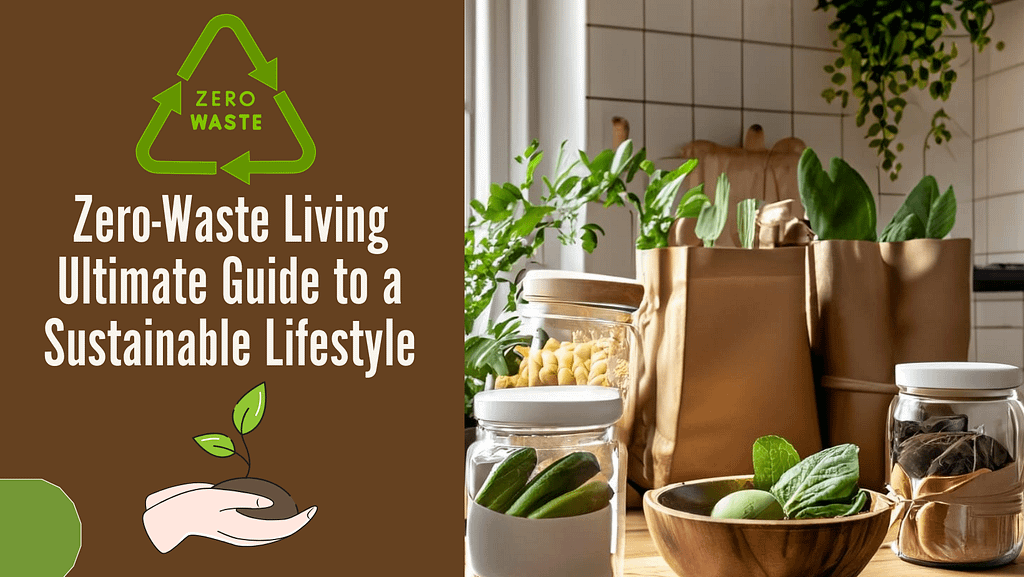Zero Waste Lifestyle: Your First Step Towards Sustainable Living

In a world that is increasingly ecologically conscious, the zero waste lifestyle has moved beyond the point of a trend and onto a movement toward a sustainable future. If you’re new to the idea of producing little to no waste, you might find this all daunting. Rest easy because transitioning to zero-waste does not need perfection, and just small, thoughtful changes will make all the difference in time. In this post, we look at a few ways you can minimize plastic waste in your everyday life and give you some real tips and tricks on how to shop for zero waste.
Guide for the Zero Waste Lifestyle Beginner
Zero waste lifestyle is all about refusing, reducing, reusing, recycling, and composting to decrease waste production. This does not mean fitting all your waste in one mason jar, although some do that; instead, it is merely being conscious about creating less waste in general.
Go Small: First, figure out which areas in your life are most wasteful. This may be in your kitchen, bathroom, or even when you go shopping. After you have found those specific areas, work with one at a time. You may start by switching disposable items with reusable ones, like changing plastic bags for cloth totes or switching to a refillable water bottle instead of buying bottled water.
Refuse and Reduce: The first two steps of the zero waste lifestyle philosophy are refusing things you don’t need and reducing the number of those you use. Say no to single-use plastics like straws and cutlery; try buying items with minimum packaging. Bring your container and bags when you go shopping so you don’t take more plastic home than you need.
Reuse what you have: Before you buy anything new, think about how you can reuse what you already own. Glass jars can be turned into storage containers or used for jams and sauces. Reusing items in this way saves a lot of money and reduces waste.
Recycle and Compost: While recycling is important, it is not the magic solution. Only recycle what can’t be refused, reduced, or reused. Composting organic waste is another great approach to reducing environmental impact. If you cannot accommodate a composting bin, consider community or indoor composting options.
Educate yourself: The more you learn about reducing your waste, the easier it will become to incorporate zero waste behaviors into daily life. Follow blogs, read books, and join online zero waste lifestyle communities. Furthermore, it is absolutely great to share your journey with other people for extra motivation.
How Plastic Waste Can Be Reduced in Everyday Life
Plastic is one of the most serious environmental issues facing us today. Shrinking plastic waste in your daily life does not require extreme modifications in your life but rather a few aware changes.
Avoid Single-Use Plastics: Grocery bags, straws, and packaging are just a few single-use plastics that account for a large portion of plastic pollution. In its place, switch to re-usable alternatives like cloth bags, stainless steel straws, and glass or metal containers.
Plastic-free products: Wherever possible, try to use products that are made without plastic or from other sustainable materials. Instead of liquid soap sold in plastic bottles, for example, purchase bar soap. Instead of a plastic toothbrush, use a wooden one.
Bring Your Own: Whenever you go out, bring your own utensils, water bottle, and coffee cup. Many coffee shops give a discount when you bring your own cup, so it’s a win-win!
Shop in bulk: The more an individual buys in bulk, the less the packaging of plastic is used in the process. Take one’s own containers to the store to fill up with items such as grains, nuts, and spices. This does not just save the waste but it is a way one could save money on.
Empower Eco-Friendly Brands: When at all possible, empower those brands that actively work to minimize their plastic footprint. Choose products that have sustainable packaging, and do not be afraid to look into a company’s environmental practices.
Zero Waste Lifestyle Shopping Tips and Tricks
Shopping for zero waste can be quite fun and rewarding. Here are some tips and tricks for how you can make this happen:
Plan Ahead: Before going out, list what you need and consider how you might avoid waste. For items bought in bulk or as produce, bring your own bags, jars, and containers.
Shop Local: One excellent way to avoid packaging waste is to shop at farmers’ markets in your area. Many farmers have minimal packaging, and you may often bring your own bags and containers.
Buying in Bulk: The first important means of zero-waste shopping is to buy in bulk. It reduces packaging, but you could also just buy the quantity that keeps you from wasting food.
Refillable Products: Look for stores that have refill stations for various products, such as laundry detergent, shampoo, and soap. These stores allow you to bring your own container and get a refill.
Be Conscientious with Labels: Pay attention to labels and packaging while shopping. Prefer merchandise wrapped in recyclable or compostable materials, and try avoiding those highly wrapped in plastic.
Conclusion
Embarking on a zero waste lifestyle journey is not about perfection; it’s about progress-one small step at a time. Making conscious choices when you go shopping will help greatly reduce plastic waste in your daily life. These are ways you can contribute to a more sustainable world. It is not about being perfect; it’s about making better environmental choices. Start off small, stay committed, and watch as your no-waste habits grow, along with inspiring others around you.
